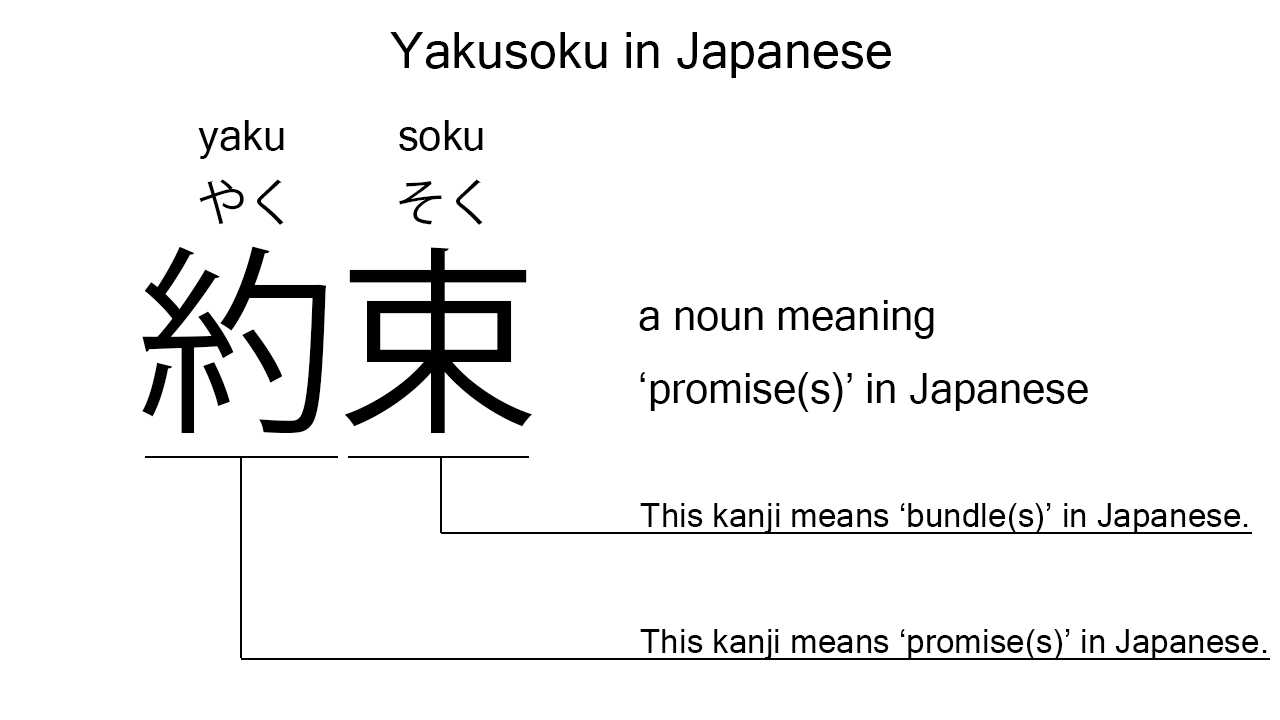What does “yakusoku” mean in Japanese?
Native speakers say “yakusoku” to mean ‘promise’ in Japanese. Perhaps, some Japanese learners know this word as it is sometimes used in Japanese movies, songs, novels, manga, anime, and the like. In this blog post, however, I will explain this word in detail based on its kanji expression. And also, I will explain how to use it through example sentences. My explanations would help Japanese learners understand “yakusoku” more clearly. Then, let’s get started!
Contents
Definition and meaning of “yakusoku”
Let me start with the definition and meaning of “yakusoku”.
- yakusoku – 約束 (やくそく) : a noun meaning ‘promise’ in Japanese. This can also work as plural. Learn more about Japanese plural.
The definition and meaning are very simple and clear. To understand this noun more clearly, however, let me explain its kanji characters in detail, one by one.
What does “yakusoku” literally mean in Japanese?
The kanji expression of “yakusoku” consists of the following two kanji characters:
- 約 : a kanji character used to mean ‘engagement’ or ‘promise’ in Japanese.
- 束 : a kanji character used to mean ‘bundle’, ‘bunch’, or ‘flux’ in Japanese.
These two kanji characters tell us that “yakusoku” literally means a ‘bundle of promises’ in Japanese. This literal interpretation is not completely in line with the actual meaning, but still very close, I think.

When we meet new kanji expressions, we should check their kanji characters in detail to understand their meanings clearly and deeply. In many cases, kanji characters tell us a lot about the meanings of the expressions they form. Actually, here, we could get the better understanding of “yakusoku” through the detailed kanji check above.
So far, I’ve explained the definition and meaning of “yakusoku” together with its kanji characters. Then, let me explain how to use it through the example sentences below.
Example #1: how to say “promise” in Japanese
kore wa boku tachi no yakusoku desu – これは僕達の約束です (これはぼくたちのやくそくです)
This is our promise.
Below are the new words used in the example sentence.
- kore – これ : a demonstrative pronoun used to refer to something close to the speaker. In the example, this is used to mean ‘this’ in Japanese.
- wa – は : a binding particle working as a case marker or topic marker. In the example, this works after “kore” to make the subject in the sentence.
- boku – 僕 (ぼく) : a pronoun meaning ‘I’ in Japanese. This is used mainly by boys and young males.
- tachi – 達 (たち) : a suffix used after a noun or pronoun to make its plural form. In the example, this is used after “boku” to make its plural form, “boku tachi”, which means ‘we’ in Japanese.
- no – の : a case particle used after a noun or pronoun to make its possessive case. In the example, this is used after “boku tachi” to make its possessive case, “boku tachi no”, which means ‘our’ in Japanese.
- desu – です : an auxiliary verb used after a noun or adjective to make it polite. Probably, this is well known as a part of Japanese desu form. In the example, this is used after “boku tachi no yakusoku” to make it sound polite.
This is a typical usage of “yakusoku”. In this example, it works as a part of the noun phrase, “boku tachi no yakusoku”, which means ‘our promise’ in Japanese. When we want to say “promise” in Japanese, anyway, this noun is always a very good option.
Example #2: another usage of “yakusoku”
kanojo wa itsumo yakusoku wo mamoru yo – 彼女はいつも約束を守るよ (かのじょはいつもやくそくをまもるよ)
She always keeps promises.
Below are the new words used in the example sentence.
- kanojo – 彼女 (かのじょ) : a pronoun meaning ‘she’ in Japanese.
- wo – を : a case particle used to make the object word in a sentence. In the example, this is used after “yakusoku” to make the object in the sentence.
- itsumo – いつも : an adverb of frequency meaning ‘always’ in Japanese. This can work almost anywhere in a sentence.
- mamoru – 守る (まもる) : a verb meaning ‘to keep’ or such in Japanese.
- yo – よ : a sentence-ending particle used to state the fact or idea softly. As the definition suggests, this is used at the end of the example sentence to state the fact softly.
This is another typical usage of “yakusoku”. In this example, it works as a part of the commonly-used phrase, “yakusoku wo mamoru”, which means ‘to keep a promise/promises’ in Japanese.
Summary
In this blog post, I’ve explained the definition and meaning of “yakusoku” in detail based on its kanji expression. And also, I’ve explained how to use it through the example sentences. Let me summarize them as follows.
- yakusoku – 約束 (やくそく) : a noun meaning ‘promise’ in Japanese. This can also work as plural. These two kanji characters literally mean a ‘bundle of promises’ in Japanese. This literal interpretation is not completely in line with the actual meaning, but still very close, I think. When we want to mean a ‘promise’ or ‘promises’ in Japanese, this noun is always a very good option.
Hope my explanations are understandable and helpful for Japanese learners.